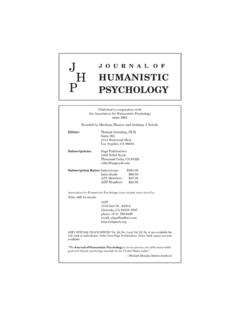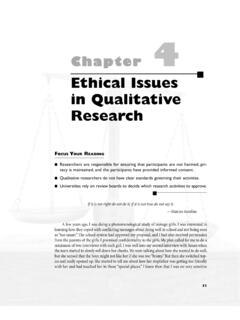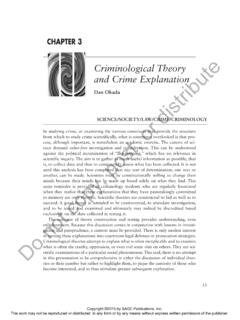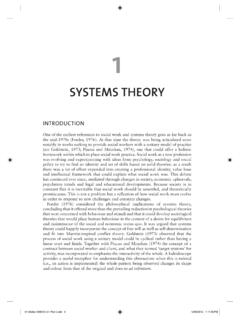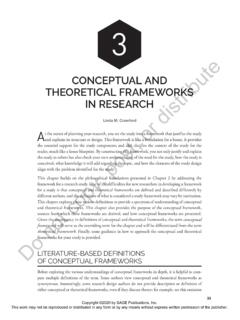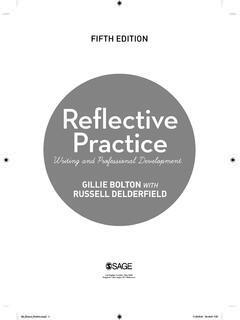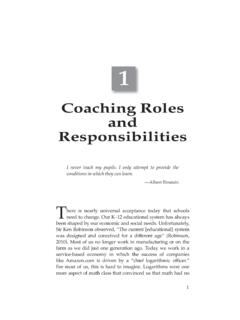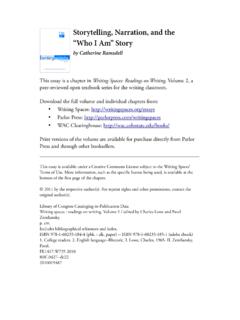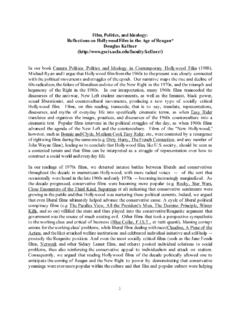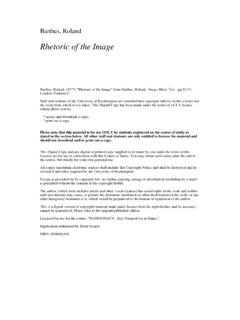Transcription of CULTURE AND CULTURAL STUDIES - SAGE Publications Ltd
1 PART ONECULTURE AND CULTURAL STUDIES01-Barker_4e-4300-Ch-01 (Part 1).indd 111/11/2011 7:54:45 PM01-Barker_4e-4300-Ch-01 (Part 1).indd 211/11/2011 7:54:45 PMAN INTRODUCTION TO CULTURAL STUDIESG iven the title of this book CULTURAL STUDIES : Theory and Practice it would be rea-sonable to expect a comprehensive account of CULTURAL STUDIES , including summaries and discussions of its main arguments and substantive sites of intellectual enquiry. Indeed, this is what has been attempted. However, I want to open this account of CULTURAL STUDIES with a kind of health warning regarding the scope of the THIS BOOKS electivityAny book about CULTURAL STUDIES is necessarily selective and likely to engender debate, argument and even conflict. To offer a truly comprehensive account of CULTURAL STUDIES would be to reproduce, or at least to summarize, every single text ever written within the parameters of CULTURAL STUDIES .
2 Not only would this be too mammoth a task for any writer, but also the problem would remain of deciding which texts warranted the nomination. Consequently, this book, like all others, is implicated in constructing a particular version of CULTURAL do offer, under the rubric of CULTURE and CULTURAL STUDIES , some (selective) history of the field. However, most of the later chapters, the sites of CULTURAL STUDIES , draw on more contemporary theory. Indeed, in order to make the book as useful as possible in as many different geographical places as possible, there is a stress on theory over context-specific empirical work (though theory is also context-specific and the text does try to link theory 101-Barker_4e-4300-Ch-01 (Part 1).indd 311/11/2011 7:54:46 PMCULTURE AND CULTURAL STUDIES4with empirical work). In doing so, I deploy a good number of theorists who would not describe themselves as working within CULTURAL STUDIES but who have something to say which has informed it.
3 Thus, writers like Tony Bennett, Paul Gilroy, Lawrence Grossberg, Stuart Hall, Meaghan Morris and Paul Willis would probably accept a description of their work as CULTURAL STUDIES . However, though extremely influential, neither Foucault, Derrida nor Barthes would have described himself in this way, just as Giddens would not adopt this self-nomination book is a selective account because it stresses a certain type of CULTURAL STUDIES . In particular, I explore that version of CULTURAL STUDIES which places language at its heart. The kind of CULTURAL STUDIES influenced by poststructuralist theories of language, representa-tion and subjectivity is given greater attention than a CULTURAL STUDIES more concerned with the ethnography of lived experience or with CULTURAL policy. Nevertheless, both do receive attention and I am personally supportive of both.
4 CULTURAL STUDIES does not speak with one voice, it cannot be spoken with one voice, and I do not have one voice with which to represent title of this book is somewhat over-ambitious in its claims. Not only is this a selective account of CULTURAL STUDIES , it is also one that draws very largely from work developed in Britain, the United States, Continental Europe (most notably France) and Australia. I draw very little from a growing body of work in Africa, Asia and Latin America. As such, it would be more accurate to call this text western CULTURAL STUDIES . I simply do not feel qualified to say how much CULTURAL STUDIES , as I understand it, is pertinent to the social and CULTURAL conditions of language-game of CULTURAL studiesFurther, this book tends to gloss over differences within western CULTURAL STUDIES , despite doubts about whether theory developed in one context ( Britain) can be workable in another ( Australia) (Ang and Stratton, 1996; Turner, 1992).
5 Nevertheless, I want to justify this degree of generalization about CULTURAL STUDIES . I maintain that the term cul-tural STUDIES has no referent to which we can point. Rather, CULTURAL STUDIES is constituted by the language-game of CULTURAL STUDIES . The theoretical terms developed and deployed by persons calling their work CULTURAL STUDIES are what CULTURAL STUDIES is . I stress the language of CULTURAL STUDIES as constitutive of CULTURAL STUDIES and draw attention at the start of each chapter to what I take to be important terms. Subsequently, each of these concepts, and others, can be referred to in the Glossary at the end of the are concepts that have been deployed in the various geographical sites of CULTURAL STUDIES . For, as Grossberg et al. have argued, though CULTURAL STUDIES has stressed conjunctural 01-Barker_4e-4300-Ch-01 (Part 1).
6 Indd 411/11/2011 7:54:46 PMAN INTRODUCTION TO CULTURAL STUDIES5analysis, which is embedded, descriptive, and historically and contextually specific , there are some concepts in CULTURAL STUDIES across the globe which form a history of real achievements that is now part of the CULTURAL STUDIES tradition , and to do without which would be to willingly accept real incapacitation (Grossberg et al., 1992: 8). Concepts are tools for thinking and acting in the STUDIES as politicsIt remains difficult to pin down the boundaries of CULTURAL STUDIES as a coherent, unified, academic discipline with clear-cut substantive topics, concepts and methods that differenti-ate it from other disciplines. CULTURAL STUDIES has always been a multi- or post-disciplinary field of enquiry which blurs the boundaries between itself and other subjects . Yet CULTURAL STUDIES cannot be said to be anything.
7 It is not physics, it is not sociology and it is not lin-guistics, though it draws upon these subject areas. Indeed, there must be, as Hall (1992a) argues, something at stake in CULTURAL STUDIES that differentiates it from other subject Hall, what is at stake is the connection that CULTURAL STUDIES seeks to make to mat-ters of power and CULTURAL politics. That is, to an exploration of representations of and for marginalized social groups and the need for CULTURAL change. Hence, CULTURAL STUDIES is a body of theory generated by thinkers who regard the production of theoretical knowl-edge as a political practice. Here, knowledge is never a neutral or objective phenomenon but a matter of positionality, that is, of the place from which one speaks, to whom, and for what PARAMETERS OF CULTURAL STUDIEST here is a difference between the study of CULTURE and institutionally located CULTURAL STUDIES .
8 The study of CULTURE has taken place in a variety of academic disciplines sociol-ogy, anthropology, English literature, etc. and in a range of geographical and institutional spaces. However, this is not to be understood as CULTURAL STUDIES . The study of CULTURE has no origins, and to locate one is to exclude other possible starting points. Nevertheless this does not mean that CULTURAL STUDIES cannot be named and its key concepts STUDIES is a discursive formation, that is, a cluster (or formation) of ideas, images and practices, which provide ways of talking about, forms of knowledge and con-duct associated with, a particular topic, social activity or institutional site in society (Hall, 1997a: 6). CULTURAL STUDIES is constituted by a regulated way of speaking about objects (which it brings into view) and coheres around key concepts, ideas and concerns.
9 Further, CULTURAL STUDIES had a moment at which it named itself, even though that naming marks only a cut or snapshot of an ever-evolving intellectual (Part 1).indd 511/11/2011 7:54:47 PMCULTURE AND CULTURAL STUDIES6 KEY THINKERSS tuart Hall (1932 )A West Indian-born British thinker initially associated with the New Left of the late-1960s, Hall was the Director of the Birmingham Centre for Contemporary CULTURAL STUDIES from 1968 to 1979. It was during this time that an identifiable and particular field called CULTURAL STUDIES began to emerge. Stuart Hall is perhaps the most significant figure in the development of British CULTURAL STUDIES . His work makes considerable use of Gramsci and the concepts of ideology and hegemony, though he also played a significant part in deploying poststructuralism in CULTURAL : Morley, D. and Chen, (eds) (1996) Stuart Hall. London: Centre for Contemporary CULTURAL StudiesCultural STUDIES has been reluctant to accept institutional legitimation.
10 Nevertheless, the formation of the Centre for Contemporary CULTURAL STUDIES at Birmingham University (UK) in the 1960s was a decisive organizational instance. Since that time, CULTURAL STUDIES has extended its intellectual base and geographic scope. There are self-defined CULTURAL STUDIES practitioners in the USA, Australia, Africa, Asia, Latin America and Europe, with each formation of CULTURAL STUDIES working in different ways. While I am not privileging British CULTURAL STUDIES per se, I am pointing to the formation of CULTURAL STUDIES at Birmingham as an institutionally significant its emergence, CULTURAL STUDIES has acquired a multitude of institutional bases, courses, textbooks and students as it has become something to be taught. As McGuigan (1997a) comments, it is difficult to see how it could be otherwise, despite the concern that professionalized and institutionalized CULTURAL STUDIES may formalize out of existence the critical questions of power, history and politics (Hall, 1992a: 286).
